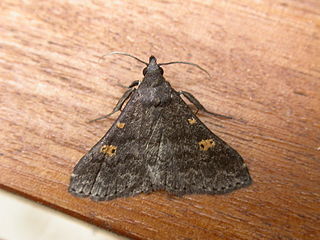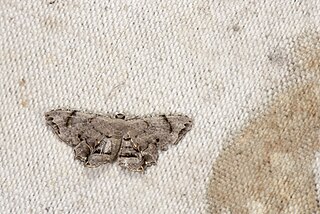
Naarda is a large genus of erebid moths currently encompassing 108 species. Initially identified by Francis Walker in 1866, it is in the family Erebidae. Somewhat ruddy in appearance, this genus is distinguishable for its generally slender thorax and abdomen, and straight, porrect labial palpi. Most species are a light tan color, but shading can reach as deep as a charcoal, with muddy yellow, conspicuous reniform, orbicular stigmata featured on the forewings, sometimes reflected bilaterally superior.
Bostrodes is a genus of moths of the family Noctuidae. The genus was erected by George Hampson in 1910.
Dunira is a genus of moths of the family Erebidae. The genus was erected by Frederic Moore in 1885.
Hypenagonia is a genus of moths of the family Erebidae first described by George Hampson in 1893. The adult moths have pale brown wings with a dark band across each wing. The wingspan of these moths is about 1 centimeter.
Lycaugesia is a genus of moths of the family Noctuidae. The genus was erected by Paul Dognin in 1910.
Mecistoptera griseifusa is a moth of the family Noctuidae first described by George Hampson in 1893. It is found in Sri Lanka.
Laelia cardinalis is a moth of the family Erebidae first described by George Hampson in 1893. It is found in Sri Lanka.

Dysaethria fulvihamata is a moth of the family Uraniidae first described by George Hampson in. It is found in Sri Lanka, Taiwan, Hong Kong, the Ryukyu Islands and Borneo.

Prasinoxena metaleuca is a moth of the family Pyralidae first described by George Hampson in 1912. It is found in Thailand, western Malaysia and Sri Lanka.
Hyperaeschrella dentata is a moth of the family Notodontidae first described by George Hampson in 1892. It is found in Sri Lanka.
Hypenagonia vexataria is a moth of the family Erebidae first described by Francis Walker in 1861. It is found in Borneo and probably in Sri Lanka,
Micraeschus rosellus is a moth of the family Erebidae first described by George Hampson in 1893. It is found in Sri Lanka and Taiwan.
Autoba brachygonia is a moth of the family Erebidae first described by George Hampson in 1910. It is found in Sri Lanka.
Hypenagonia flavisigna is a moth of the family Noctuidae first described by George Hampson in 1912. It is found in Sri Lanka.
Hypenagonia longipalpis is a moth of the family Noctuidae first described by George Hampson in 1912. It is found in Sri Lanka.
Hypenagonia nigrifascia is a moth of the family Noctuidae first described by George Hampson in 1893. It is found in Sri Lanka.
Hypena assimilis, is a moth of the family Erebidae first described by George Hampson in 1891. It is found in India, Sri Lanka and Taiwan.
Hypena griseapex, is a moth of the family Erebidae first described by George Hampson in 1891. It is found in India and Sri Lanka.
Hypena obfuscalis, is a moth of the family Erebidae first described by George Hampson in 1893. It is found in Sri Lanka.
Selepa plumbeata is a moth of the family Nolidae first described by George Hampson in 1912. It is found in Oriental tropics of India, Sri Lanka, and Borneo.

